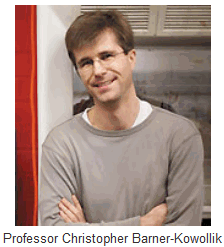|
|
|
|
|
|
|
News & Views item - October 2009 |
![]() Germany's "Excellence Initiative" Deemed a Success. (October 5, 2009)
Germany's "Excellence Initiative" Deemed a Success. (October 5, 2009)
 In
2005 Germany's federal government launched its "Excellence Initiative" to
upgrade the country's university sector to allow it to compete with that of
England and the United States.
In
2005 Germany's federal government launched its "Excellence Initiative" to
upgrade the country's university sector to allow it to compete with that of
England and the United States.
Two rounds of the initiative have now been completed and a third is in the offing. According to Matthias Kleiner, president of the Deutsche Forschungsgemeinschaft (DFG), Germany’s leading granting agency: "No other recent programme has had a similar impact on German science." For the third round of the funding (scheduled for 2012 - 1217) €2.7 (A$4.5) billion will be made available and over 100 of Germany's universities have been invited to submit proposals by the third quarter of next year for new research projects.
According to Nature: "[O]ver the past three years some 4,200 new jobs in science have been created. The largest group of beneficiaries are young group leaders, postdocs and PhD students. The initiative has also created hundreds of permanent positions for full professors and science managers."
Proposals for funding can be submitted by graduate schools, large-scale research
"clusters of excellence" and for what are termed "future concepts"; institutions
obtaining grants in all three catagories are classified as ‘elite’. To date
Munich's two universities are so classified, as have universities in Aachen,
Freiburg, Heidelberg, Göttingen, Konstanz, Berlin and the Karlsruhe Institute of
Technology (KIT).
Last year, Christopher Barner-Kowollik moved his group of eight from the University of New South Wales to KIT. He told Nature that he'd: "been warned that Germany is a country ruled by pessimism and bureaucracy. I found that none of this is true any more."
With the re-election of physicist/physical chemist Angela Merkel as German Chancellor and the beginning indications of an upswing in the German economy, Professor Barner-Kowollik may be on to a winner.